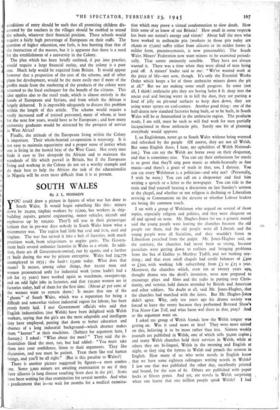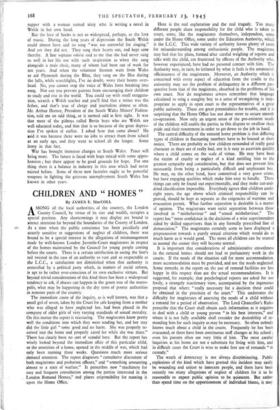SOUTH WALES
By J. L. HODSON
yOU could draw a picture in figures of what war has done to South Wales. it would begin something like this: miners down by 20,000, tinplate workers by 12,000, but workers in ship- building repairs, general engineering, motor vehicles, aircraft and explosives up by too,000. They'll tell you in their picturesque fashion that in pre-war days nobody in South Wales knew what a micrometer was. The region had little but coal and iron, steel and tinplate. The war has turned it into a belt of factories, with much precision work, from teleprinters to engine parts. The Govern- ment built several ordnance factories in Wales as a whole. In addi- tion, there are 28 Government-owned, run by agents, and a further 21 built during the war by private enterprise. Wales had 234,776 unemployed in 1933; she hasn't is,000 today. What does that mean? It means, among other things, that to,000 men and women pronounced unfit for industrial work (some hadn't had a job for 15 years) have worked again as watchmen, sweepers-up, and on odd light jobs in factories, and that 130,000 women are in factories today, half of them for the first time. (About 47 per cent. of the women want to remain there.) It means that one of the "ghosts" of South Wales, which was a reputation for being a difficult and somewhat violent industrial region for labour, has been prettY firmly laid. I met Government officials who said that English industrialists (not Welsh) have been delighted with Welsh workers, saying that the girls are the most adaptable and intelligent they have employed, putting that down to better education and absence of a long industrial background—which absence makes them "keener" at their machines. (Subject for argument here, I daresay.) I asked : "What about the men?" They said the in- dustrialists liked the men, too, but had added: "You must take hem into your confidence, listen to their arguments. They like discussion, and you must be patient. Treat them like real human beings, and you'll be all right." (But is this peculiar to Wales?) There is another picture suggested by figures—a most sombre . one. Some 3,000 miners are awaiting examination to see if they have silicosis (a lung disease resulting from dust in the pit). Some lave been waiting for that examination for several months. And what = predicament that is—to wait for months for a medical examine-
tion which may prove a virtual condemnation to slow death. How little some of us know of our Britain! How small in some respects has been our nation's energy and vision! About half the men who have worked in anthracite pits (workers in those pits today are 16,000 or 17,000) suffer either from silicosis or its milder forms (a milder form, pneumoconiosis, is now pensionable). The South Wales Miners' Federation now want miners to be examined periodi- cally. That seems eminently sensible. They have not always wanted it. There was a time when they were afraid of men being paid off. A miners' leader said to me: "We've wanted work at the price of life—not now, though. It's only the Essential Works Order which keeps a lot of those anthracite miners down the pit at all." But we are making some small progress. In some (not all, I think) anthracite pits they are boring holes 8 ft. deep into the uncut coal and forcing water in to kill the dust, they are putting a kind of jelly on pit-road surfaces to keep dust down, they are using water sprays on coal-cutters. Another good thing : one of the half-dozen new standard factories being built, or to be built, in South Wales will be at Ammanford in the anthracite region. The products made, I am told, must be such as will find work for men partially incapacitated in those anthracite pits. Surely one bit of planning everybody would approve.
I, an Englishman, never go to South Wales without being warmed and refreshed by the people (Of course, they are not all Welsh. But some English there, I hear, are upholders of Welsh National- ism.) You can say the Welsh are borne away on their eloquence, and that is sometimes true. You can say their enthusiasm for music is so great that they'll sing poor music as whole-heartedly as fine music—and there's a grain of truth in that, too, I daresay. You can say every Welshman is a politician—and why not? (Personally, I wish he were.) You can call on a shopowner and find him writing a speech or a letter to the newspaper. You can ride in the train and find yourself hearing a discussion on last Sunday's sermon at the chapel, and whether or not religion is declining or Liberalism reviving or Communism on the descent or whether Labour leaders are losing the common touch.
I sat with a group of Welshmen who argued on several of those topics, especially religion and politics, and they were eloquent on all and agreed on none. Mr. Hughes-Jones (to use a generic name) said the young people were leaving the churches because the old people ran them, and the old people were all Liberals and the young people were all Socialists, and they wouldn't listen to Liberalism preached from the pulpit. Mr. Jones-Hughes said, op the contrary, the churches had never been so strong, because preachers were getting down to realities and bringing problems from the Sea of Galilee to Merthyr Tydfil, and not burking any- thing ; and that even small chapels had credit balances of f.,400 or L500, with working folk subscribing from £3 to kis a year. Moreover, the churches which, even ten or twenty years ago, thought drama was the devil's invention, were now prepared to encourage plays and films and the radio in putting over Chris- tianity, and vestries held dances attended by British and American and other soldiers. No doubt at all, said Mr. Jones-Hughes, that the churches had marched with the times. But Mr. Hughes-Jones didn't agree. Why, only ten years ago his drama society was forced to leave the vestry because they performed Bernard Shaw's You Never Can Tell, and what harm wa§ there in that, pray? And so the argument went on.
I asked my group of Welsh friends how the Welsh tongue was getting on. Was it used more or less? They were more united on this, believing it to be more rather than less. Sixteen weekly journals are published in Welsh, one of which sells Am) copies ; and many Welsh churches hold their services in Welsh, while at others they are bi-lingual, Welsh in the morning and English at night, or they sing the hymns in Welsh and preach the sermon in English. How many of us who write novels in English know that we have some eighteen colleagues writing novels in Welsh? I iaw one that was published the other day, excellently printed and bound, for the sum of 6s. Others are published with paper backs at fifteen pence. And yet, are novels in Welsh surprising when one learns that one million people speak Welsh? I had supper with a woman turned sixty who is writing a novel in Welsh in her own hand.
But the love of books is not so widespread, perhaps, as the love of music. During the long years of depression the South Welsh could almost have said its song "was too sorrowful for singing." And yet they did not. They sang their hearts out, and kept sane thereby. A fine soprano soloist said to me that she had never sung so well in her life nor with such inspiration as when she sang alongside a male choir, many of whom had been out of work for ten years. And when the volunteer firemen went from Wales to aid Plymouth during the Blitz, they sang on the Hoe during the lulls, while searchlights, I've no doubt, wove their beams over- head. No, you cannot stop the voice of Wales from breaking into song. Nor can you prevent parents from encouraging their children to study and rise in the world. You could say with small exaggera- tion, scratch a Welsh teacher and you'll find that a miner was the father, and that's true of clergy and journalists almost as often. Mr. Arthur Homer, President of the South Wales Miners' Federa- tion, told me an odd thing, or it seemed odd at first sight. It was that most of the pitboys called Bevin boys who are Welsh are well educated today, and that that is so because of the great depres- sion I've spoken of earlier. I asked how that came about? He said it was because there were no jobs to attract them from school at an early age, and they went to school all the longer. Some irony in that fact.
Wax has brought immense changes to South Wales. Peace will bring more. The future is faced with hope mixed with some appre- hension; but there appear to be good grounds for hope. For one thing there is a balance in industry in this area which had never existed before. Some of those new factories ought to be powerful weapons in fighting the grievous unemployment South Wales has known in other years.



























 Previous page
Previous page